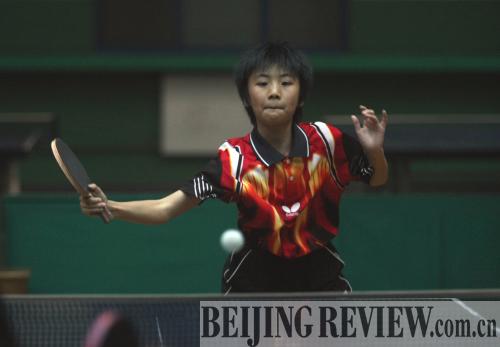|
 |
|
FUTURE STAR: Twelve-year-old Yang Chen from Xinjiang plays table tennis during a training class. Yang is a top student at Beijing's Shichahai Sports School, which has produced more than 30 world champion athletes (JIANG XIAOYING) |
Twelve-year-old Yang Chen puts on a shy smile whenever answering a question, concealing the fact that one day soon she may be a world champion.
Yang's odds of reaching the pinnacle of achievement are in her favor. Once she steps onto the table tennis court, she transforms into another person—one with amazingly fast reflexes, a subtle understanding of competitive psychology and a good measure of courtside bravado. She deftly thrusts her racket to fire sharp-angled balls at furious speed and smacks them back with unpredictable spins. She shouts loudly to cheer herself on after winning every point and stares at her opponent to convey a clear relentlessness after missing a ball.
She is a student at Shichahai Sports School, which refers to itself as "the cradle of world champions." Located on the west bank of Shichahai Lake, one of the busiest bar areas in Beijing, the school has produced more than 30 world champions in sports ranging from gymnastics to taekwondo since its founding 51 years ago. The school, home to about 600 students from 6-year-olds and up, trains pupils in eight sports. It was on the list of 300 similar Chinese schools at the end of last year that China's General Administration of Sport upgraded to training bases for future athletes.
One of Shichahai's greats and Yang's idol is Zhang Yining, the winner of four Olympic gold medals in table tennis.
"We both hold the racket with the shake-hand grip," said Yang.
Zhen Jiuxiang, a veteran table tennis coach at Shichahai, said he often uses champion alumni as examples to cheer up students who have become bored with training, which lasts three hours a day on weekdays and six hours a day during summer and winter vacations.
"Another secret stimulus used by coaches is to miss balls on purpose during training matches before a major competition to boost students' confidence," said Zhen.
Like many of her schoolmates, Yang is not from Beijing. Her first tutor was her mother's brother, an amateur table tennis player who began teaching her when she was 8 years old. Two years later, her blossoming talent compelled her parents to bring Yang to Shichahai from their hometown in Urumqi, capital of Xinjiang Uygur Autonomous Region and a city nearly 3,000 km west of Beijing.
Zhen has visited more than two dozen countries and still believes that China's government-funded sports-school system has been the key to the country's decades-long dominance in table tennis.
"Under the club system in some European countries, I saw talented young players who rarely have an opportunity to play with opponents on their level, which is bad for their development. I felt sorry for them," said Zhen.
After training at Shichahai for three or four years, young table tennis players who are around the age of 12 are evaluated by their coaches. Elite players, those who are in the top 25 percent of their class, will be sent to professional teams. Others go back to regular schools and continue to play the game as a hobby, which can help them get admitted to universities.
"While they train to be table tennis players, we impart in them strong bodies, fearless minds and fighting spirits, which can help them succeed in any career they embark upon," said Zhen.
He said many students he has trained over the last 30 years have become successful entrepreneurs, military officers and surgeons. But he said fewer and fewer parents in big cities like Beijing and Shanghai are willing to let their children train to become professional athletes.
"They don't want their only children to go through the hardship of training," Zhen said.
Shi Fenghua, Shichahai's Vice Principal, said China's gold medal haul at the 2008 Olympics has boosted Chinese parents' and children's interest in training in Olympic events and has also attracted a growing group of foreign students to Shichahai. However, Chinese children are increasingly only willing to register for short-term programs as amateurs at Shichahai, rather than becoming full-time students.
"The Olympics have failed to bring in more applicants to our full-time programs. For some events like boxing and free fighting, our coaches now have to search for talent outside of Beijing," Shi said. | 